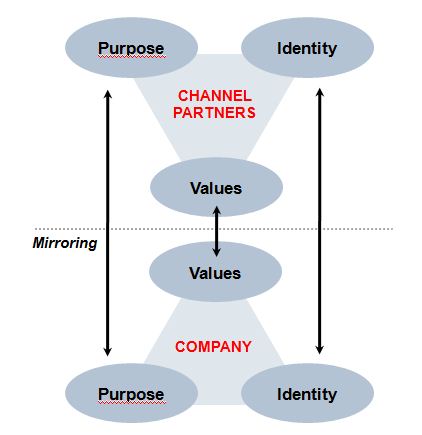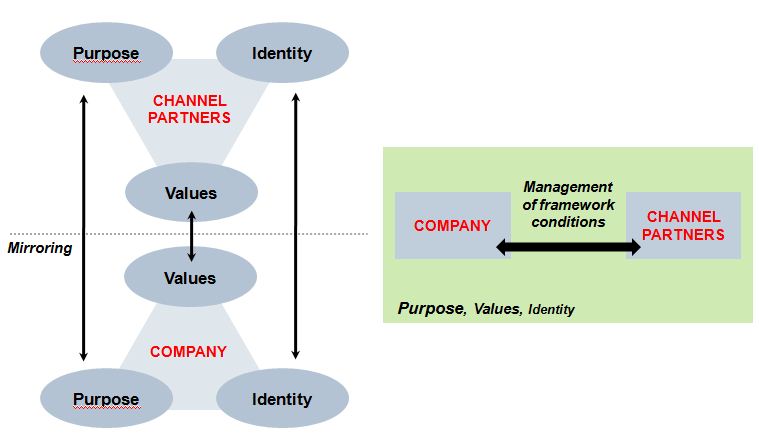Categories: Seminar SS11
Marketing Values to Channel Partners
by Sarah Brecht, Marc Vogelsang and Adrian Saile
Marketing 3.0: From Products to Customers to the Human Spirit.
Marketing Values to Channel Partners (Chapter 5)
Philip Kotler (et. al.)
The trend of globalization is interrelated with the need to enter undeveloped markets to generate profit or value. Traditional kinds of distribution might not work in those markets since social, economical and ecological matters differ from those in developed markets. Furthermore, there are no developed consumer interfaces, which have to be developed in cooperation with regular channel partners, who offer the know-how and contacts for the respective market.
On the other side, there are the developed markets in industrialized countries, where the societies become more sophisticated and demanding, which requires new kinds of distribution but on another level. Basic needs of consumers lose importance and are replaced by higher customer needs, which require consideration of social and ecological factors. In this „era of post-growth society“ (James Speth) customization as a result of technologically advanced distribution becomes less important, while channel partners, who can communicate certain aspects to the customers, rise in importance. Channel partners also offer customer service and most importantly give the companies access to new clienteles.
As a result of these trends, technological progress in the field of distribution is opposed to a rising importance of channel partners, which leads to our first thesis:
Thesis 1: Channel Partners are more important to companies than ever before.
This importance must be understood not only in connection to the aforementioned practical aspects, but also according to the different roles channel partners have in the marketing process. They are hybrids of companies with their own values and business models, consumers with their own needs and wants, and employees who form the consumer interface. Their role is even more essential since they become collaborators, cultural change agents and creative partners for the companies at the same time.
Once the companies understand the importance of channel partners, choosing partners is the next important step in the process. The key factor in channel partner selection is the mirroring of three elements: firstly purpose, which means the overall key objective of a potential channel partner, secondly identity, which means the character of a potential channel partner, and finally values or convictions.
In order for the partnership to work, those three aspects have to be correspond completely, as seen in the illustration. A company has to choose those channel partners that share the exact same purpose, identity and values, if it wants their products to be marketed successfully.
In this context, the concept of Marketing 3.0 implies a collaboration of partners on one and the same level. Goals, values and identities have to be mirrored by a mutual understanding of business models, win-win negotiations and solid contracts. The basic idea is to reach this goal via a personal approach, where the management of a company first gets to know their partners on a personal level. This basic concept can be summarized in our second thesis:
Thesis 2: Channel partners must become allies
Taking this thesis as the base of an individual approach to distribution, it has to be practiced as well as communicated. If the channel partner does not profit from the relationship, a discrepancy is created, which leads to discontent and indirectly to revenue losses. While profit margins might lessen with this approach, increasing sales and sustainable customer relations offer new advantages. These aspects have to reflect within the communication towards channel partners, which in return leads to a profitable positioning of the company’s products.
In this context, the partnership can have a crucial impact on two important aspects of the realization of the concept of Marketing 3.0, the communication of values to customers and relationship management. In their role as communication partners, channel partners can serve as catalysts of cultural change, as well as cultural allies. If a company chooses not to communicate with the customers directly, or is not able to offer points of contact to the consumer, channel partners have to market the values of the company through personal contacts. On the other hand customers can serve as a base of trust between the company and their channel partners, if the values are communicated directly.
Once again the knowledge of the partner is crucial in this context. This includes factors like their own contribution to the channel partner’s profit margin, their strategic importance for the partners, the general impression and the contentment of the partner and in a second step active management of the sales process via co-op marketing or in-store promotion.
Both of these aspects emphasize the importance of integration of distribution channels to use synergies against competitors. This can happen in a number of steps. A regular cooperation is followed by a process of integration including exchange of information and joint planning finally leading into a unification of values.
Thesis 3: Not just the choice but also a continuous instruction of channel partners is essential to a successful partnership
An active exchange is an essential step to the success of this „business-partner-concept“, which creates additional value for the company, as customers and channel partners can contribute to the development and improvement of products. Channel partners, i.e. their sales personnel, have to be properly instructed according to the objectives of the business, and rewarded via incentives, bonus-programs and fair profit margins.
In everyday business operations, objectives or values do not have to be completely congruent, but should not be contrary. If this condition is not complied, not only the relationship between the business partners is affected, but indirectly the credibility towards customers might be destroyed.
Because of this one of the main challenges in the cooperation with channel partners besides the alignment of values and goals and a partnership on the same level are those values and goals themselves. This leads to our next thesis:
Thesis 4: Values, objectives and identities of companies and channel partners are characterized by social codes
If a company wants to act successfully on a global level, it has to compound, but carefully and not without communicating the respective changes.
New markets might for example be approached via subsidiaries with new brands and new objectives and values. If the mirroring of values does not work, the company even might change their own approach to values. In any case the channel partners, and on a second level the underlying social codes have to be understood and taken seriously to realize economic success in the partnership.
Wrap up: Value-oriented partnerships in distribution channels
The management of distribution channels has to consist of two essential steps. The first one is the choice of appropriate channel partners via mirroring of objectives, identity and values. This way, partners can persuade consumers with the communication of their values. The following second step is integration, which adds integrity to the communicated values.
One good example of a successful implementation of this concept is the company „The Body Shop„, which is growing by franchising, which adds importance to the choice of franchise partners. For a successful partnership they had to share the company’s objective of natural ingredients and fair trade and the central values honesty and simplicity.
The key factor in choosing them was the personal approach. The company founder herself chose her business partners personally, by looking for similar ecological and social values and for people who wanted to achieve something as opposed to people looking for profit. As a result, The Body Shop grew by 50 per cent per year in its first ten years, and is now operating 1730 stores in 49 countries with a worldwide revenue of 800 million US-$.
Critical Evaluation
In general, Kotler’s concept can be rated very positively. Channel partners are always important and the relationship has to be cultivated. However there are certain aspects, which can be viewed critically.
The chosen partners have to be suitable for the respective company, however the concept of mirroring values beforehand is not always practically relevant or desirable. More value has to be placed on communication and control – from both sides – so one partner cannot damage the other one.
This of course correlates with the business sector of the company. For example a company like „Globetrotter Ausrüstung“ (a german mail order company for outdoor attire) has a customer base with certain values concerning social matters. In this case the image of the company could be compromised, if they are selling products of a company that is e.g. involved in child labor. In other areas, for example in the electronics business, the retailer is much less connected to the products sold, and will not be affected too much by charges against one of his suppliers.
Furthermore, the aspect of Kotler’s approach towards channel partners is the view of customer preferences on developed and undeveloped markets. Kotler states that customers in mature markets today are not placing value on individual configuration anymore, which might not be completely true. It is true however, that the customer must not be seen as an expert. But if configurational options are implemented in an understandable and transparent way, they can still create a competitive advantage. The economical and social effects, that Kotler is emphasizing, are still gaining importance, if products on a market become increasingly similar in their amenities.
Regardless of this, Kotler is emphasizing the approach to new markets in emerging countries. Although this is true, the aforementioned aspects are more applicable to established markets, where the concept of Marketing 3.0 in the distribution process might be even more important.
The basic concept of a restructuring of distribution channels still contains many important aspects that should be applied in the marketing process of companies. The approach to mirror objectives, values and identities is most important in this context. However, it needs to be noted, that the mirroring itself is probably less important than the management of framework conditions like communication between partners, profit margins, incentives, etc. Identical values are an approach but not a guarantee for a successful partnership.
Advancement of Kotler’s Concept
If you think about Kotler’s concept, there is room to improve on the basic ideas without compromising them. In order to do this, we have to drop the idea of a direct mirroring of purpose, values and identity. Using this suggestion would equal looking for one and the same company as a partner, which will not have the kind of customer access, that the company itself does not have.
The illustration shows our suggestion for an advancement of Kotler’s concept. Purpose, identity and values do not have to correspond completely, but still form a good approach to choose partners and should not be opposed to each other. In our concept, the three aspects have to be restructured hierarchically – e.g. purpose is more important than identity – and form the framework of conditions, under which the partners have to work together.
The most important thing for the company within such a partnership is the management of this framework: communication, training, decent profit margins, price stability, decent recommended retail prices, a fast supply process, incentives, promo material, co-op marketing, etc. This way they can establish a communication process, where both partners can profit from shared information, e.g. the detection of problems cia the channel partner with direct customer contact.
Source: Kotler, Philip et al. (2010): Marketing 3.0: from products to customers to the human spirit. Hoboken: Wiley.
06 Juni 2011 admin





